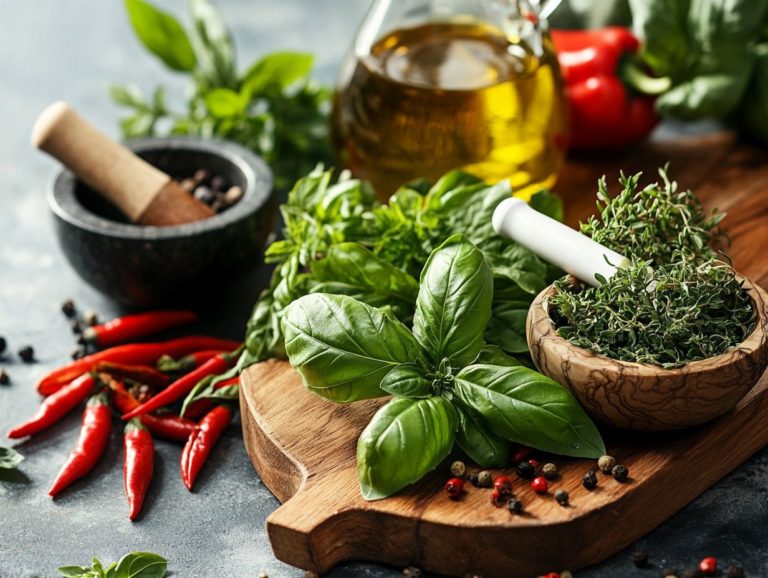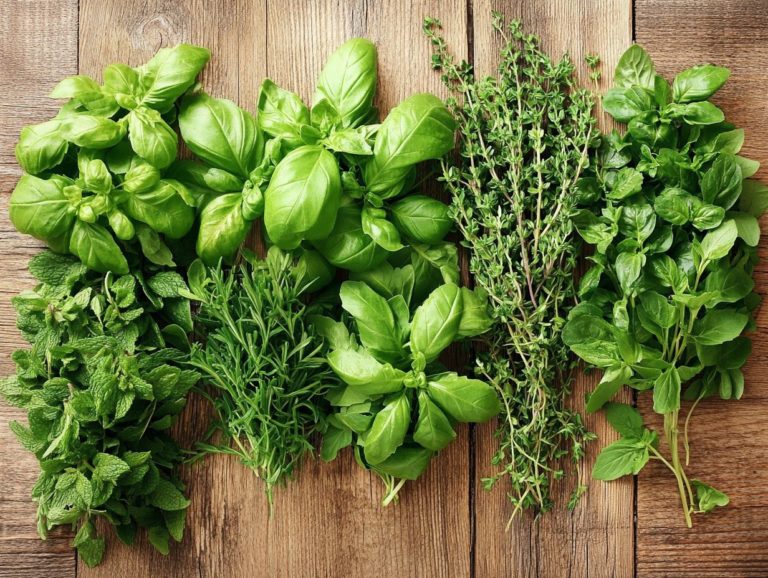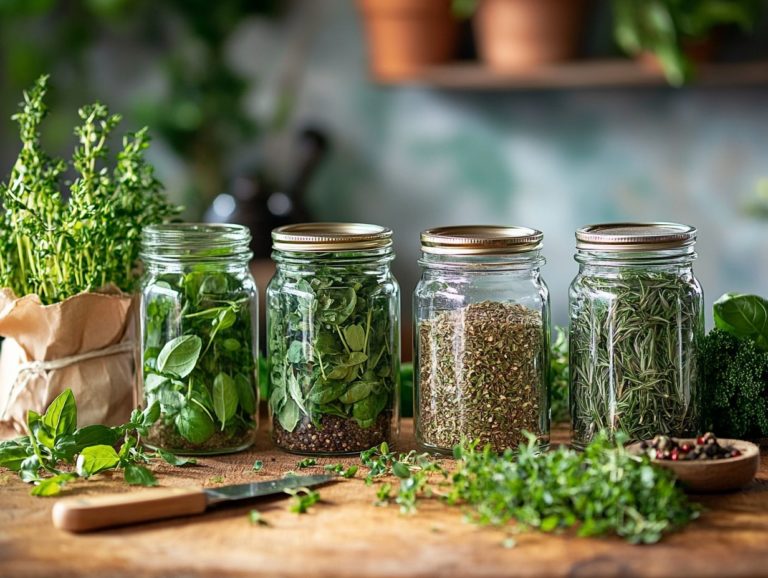5 Herbs for Reducing Inflammation
Chronic inflammation can invite a myriad of health challenges into your life, but nature offers potent allies in the form of herbs. Get ready to discover five remarkable herbs turmeric, ginger, garlic, cayenne pepper, and cinnamon that not only combat inflammation but also provide a host of additional health benefits.
Discover how to seamlessly incorporate these herbs into your diet, explore their potential side effects, and determine their safety for various individuals. We’ll also touch on other natural remedies that might enhance your wellness journey. Let s dive into the incredible world of herbs!
Contents
- Key Takeaways:
- 1. Turmeric
- 2. Ginger
- 3. Garlic
- 4. Cayenne Pepper
- 5. Cinnamon
- How Do These Herbs Help with Inflammation?
- Frequently Asked Questions
- What are the top 5 herbs for reducing inflammation?
- How do these herbs help reduce inflammation?
- Can these herbs be used as a natural alternative to medication for inflammation?
- Are there any potential side effects of using these herbs for reducing inflammation?
- How can I incorporate these herbs into my diet?
- Are there any precautions to consider when using these herbs for reducing inflammation?
Key Takeaways:
- Turmeric, ginger, garlic, cayenne pepper, and cinnamon are five powerful herbs that can help reduce inflammation in the body.
- These herbs also boost immunity and improve digestion.
- These herbs can be easily incorporated into a diet by adding them to dishes or brewing them into teas.
1. Turmeric
Meet turmeric, the golden spice with remarkable health benefits! Turmeric, a striking yellow spice from the Curcuma longa plant, is celebrated for its remarkable anti-inflammatory properties, largely thanks to its active compound, curcumin.
You might be surprised to learn that this herbal remedy has been a cornerstone of traditional medicine for centuries, especially in Asian cultures. It s cherished not just for its flavor but also for its extensive health benefits in tackling chronic inflammation and various health issues, including arthritis and inflammatory bowel disease.
Historically, this spice has played a pivotal role in Ayurvedic and Chinese medicine, showcasing its significance as a natural remedy for a variety of ailments. However, curcumin, while powerful, often encounters challenges with how well the body absorbs it, which can limit its effectiveness.
To boost absorption, it’s frequently suggested that you consume turmeric alongside black pepper or fat. Research indicates that curcumin can help alleviate chronic pain, reduce arthritis symptoms, and lower inflammation levels.
This makes it a sought-after option for those in search of natural health solutions. Its exceptional ability to modulate inflammatory pathways highlights its importance in both traditional healing practices and contemporary health discussions.
2. Ginger
Ginger, that delightful spice harvested from the rhizome of Zingiber officinale, is not just a culinary gem; it s also revered for its unique flavor and impressive health benefits. It can ease chronic inflammation and the pain that often accompanies it.
Rich in bioactive compounds like gingerol and shogaol, ginger has a long history in traditional medicine for treating various inflammatory conditions and bolstering immune function.
These powerful constituents work in harmony to combat oxidative stress, which plays a significant role in inflammation. By embracing different forms of ginger be it a soothing cup of ginger tea or a sprinkle of ginger powder in your daily meals you can effortlessly enjoy its many advantages.
Whether blended into smoothies, stirred into soups, or baked into your favorite treats, ginger can integrate seamlessly into a balanced diet. This not only elevates your culinary creations but also promotes your overall health, allowing you to take a proactive stance against inflammation in a natural way.
3. Garlic
Garlic, scientifically known as Allium sativum, is not just a culinary staple; it s a powerhouse of health benefits, particularly when it comes to its anti-inflammatory properties that may help fight chronic inflammation.
Rich in sulfur compounds, garlic supports immune function and helps reduce inflammatory markers, making it a formidable ally in any health-focused diet. Incorporating garlic into your daily meals is a delightful way to enhance flavor while bolstering your well-being.
Its compounds, such as allicin, have been shown to inhibit the production of pro-inflammatory substances in the body. For those eager to elevate their culinary game, adding minced or roasted garlic to vegetable stir-fries, soups, and marinades brings an aromatic flair that contributes to overall wellness.
Drizzling garlic-infused olive oil over roasted vegetables or mixing it into homemade salad dressings can infuse your dishes with its pungent aroma and health benefits. Even the simplest pasta recipes can be transformed by saut ing garlic, providing an effortless yet impactful way to promote good health.
Start your herb journey today! Try adding turmeric to your next meal and feel the difference!
4. Cayenne Pepper
Cayenne pepper, renowned for its fiery heat, is more than just a spice; it’s a powerhouse of health benefits thanks to capsaicin, a compound celebrated for its remarkable anti-inflammatory properties. This herbal gem has long been embraced in traditional medicine for its ability to alleviate pain and reduce inflammation, making it a staple ingredient in many anti-inflammatory recipes.
Capsaicin works its magic by desensitizing nerve receptors that signal pain, offering significant relief for those grappling with conditions like arthritis or neuropathy. When you incorporate cayenne pepper into your cooking, you’re not just adding a vibrant kick; you’re also enhancing your overall health by potentially lowering the risk of chronic pain ailments.
Its warm, zesty flavor can invigorate curries, soups, and sauces, transforming meals into a culinary delight and a strategic choice for managing inflammation. Explore the myriad culinary uses of cayenne, and you might uncover its broader health benefits, turning your kitchen into a delicious battleground against discomfort.
5. Cinnamon
Cinnamon, that cherished spice sourced from the inner bark of Cinnamomum trees, is not just a delightful addition to your culinary creations; it also brings remarkable anti-inflammatory and antioxidant benefits that can elevate your overall health. Regularly indulging in cinnamon can help you manage blood sugar levels, lower inflammatory markers, and boost your immune function, making it a standout in the realm of anti-inflammatory foods.
Rich in powerful antioxidants like polyphenols (compounds that combat oxidative stress), cinnamon plays a pivotal role in protecting against chronic illnesses such as heart disease and diabetes. By seamlessly integrating this spice into your daily meals, you can effortlessly harness its numerous benefits.
For example, consider:
- Sprinkling it over your morning oatmeal,
- Blending it into your smoothies,
- Using it as a seasoning for roasted vegetables.
You can also add it to warm beverages like herbal teas or coffee, enriching the flavor and health profile of those drinks.
How Do These Herbs Help with Inflammation?
The herbs you’ve just encountered—turmeric, ginger, garlic, cayenne pepper, and cinnamon—each possess distinctive anti-inflammatory properties that can effectively assist in managing chronic inflammation and improving various inflammatory conditions. Using these natural remedies, such as 5 powerful herbs for pain relief, can be a game-changer, aligning perfectly with a holistic health approach rooted in herbal medicine. These compounds help reduce inflammatory markers and cytokines (proteins that signal inflammation) while bolstering immune function and enhancing overall well-being.
Turmeric, for instance, boasts curcumin, a powerful compound known for its ability to inhibit specific inflammatory pathways. Ginger follows suit, with active ingredients that can significantly lower inflammation levels. Garlic, rich in sulfur compounds, delivers strong anti-inflammatory effects. Cayenne pepper, thanks to its capsaicin content, effectively diminishes pain signals, making it a remarkable ally for those grappling with chronic pain. Meanwhile, cinnamon s antioxidants tackle oxidative stress, often exacerbating inflammatory conditions.
Start using these herbs in your meals now for better health! Whether through teas, spices, or supplements, you can foster improved long-term health and potentially lessen your reliance on pharmaceutical treatments.
Discover the Amazing Health Benefits of These Herbs!
These herbs do more than fight inflammation; they can improve your immune function, boost digestion, and provide antioxidant properties that support overall health.
Many of these herbs, rich in antioxidants, combat oxidative stress and help prevent chronic diseases like heart disease and cancer. Including garlic in your meals gives your immune system a strong boost. Rosemary can improve memory and concentration thanks to its antioxidants.
Add basil or oregano to pasta dishes. Use turmeric in stir-fries to enhance flavor and enjoy its health benefits.
Exciting Ways to Add These Herbs to Your Diet!
Turmeric, ginger, garlic, cayenne pepper, and cinnamon are delicious and beneficial. These anti-inflammatory foods enhance the flavor of your meals.
Blend turmeric into smoothies for color and flavor. Ginger adds zest to stir-fries and marinades, while roasted garlic makes a delightful spread. If you crave a spicy kick, cayenne pepper is perfect for seasoning meats or sprinkling over avocado toast. A simple dusting of cinnamon over fruits or in baked goods can add comforting warmth to your dish.
If you prefer convenient alternatives, herbal supplements like turmeric capsules and green tea extract offer a hassle-free way to enjoy the benefits of these potent herbs.
Be Aware: Possible Side Effects of These Herbs
Turmeric, ginger, garlic, cayenne pepper, and cinnamon are generally safe. However, they can sometimes cause allergic reactions or interact with medications.
Your individual health profile affects how these herbs affect you. For instance, turmeric might upset your stomach, while ginger can interfere with blood thinners, increasing bleeding risk. Garlic can lower blood pressure, which may pose a risk if you re on antihypertensive medications.
If you re serious about enhancing your health with these powerful herbs, seeking professional advice is key. This ensures that any potential contraindications related to your health history and current medications are thoroughly addressed.
Are These Herbs Safe for You?
Turmeric, ginger, garlic, cayenne pepper, and cinnamon’s safety depends on your health conditions and medications. Always assess their suitability for you.
If you have chronic conditions or are preparing for surgery, be cautious. Some herbs might interact with your treatments or affect blood clotting mechanisms. Consulting with healthcare professionals is crucial to monitor potential side effects.
Everyone reacts differently to herbal supplements. Seek personalized advice when adding these ingredients to your daily routine.
What Are Some Other Natural Remedies for Inflammation?
Along with turmeric, ginger, garlic, cayenne pepper, and cinnamon, there are several other natural remedies recognized for their effectiveness in tackling inflammation. Resveratrol, frankincense, and various herbal compounds can enhance your holistic approach to managing inflammatory conditions while positively impacting your overall health.
Resveratrol, commonly found in red wine and berries, has strong anti-inflammatory properties that may help reduce swelling and pain. This makes it a valuable ally in your inflammation management toolkit. Frankincense, derived from tree resin, is well-known for alleviating joint pain and improving overall well-being.
Omega-3 fatty acids, found in fish oil and flaxseeds, serve as powerful anti-inflammatory agents that support heart health and lower the risk of chronic diseases. By incorporating these remedies into your lifestyle, you can build a comprehensive strategy that helps combat inflammation while promoting a more balanced state of health.
Check out this video to learn more about natural remedies for inflammation!
Frequently Asked Questions
What are the top 5 herbs for reducing inflammation?
The top 5 herbs for reducing inflammation are turmeric, ginger, garlic, rosemary, and cinnamon.
How do these herbs help reduce inflammation?
These herbs contain substances that help reduce swelling and pain in the body.
Can these herbs be used as a natural alternative to medication for inflammation?
Yes, you can use these herbs instead of medication. Just consult your doctor first!
Are there any potential side effects of using these herbs for reducing inflammation?
While these herbs are generally safe, some people might experience side effects like stomach upset or allergic reactions. Start with small amounts and watch for any reactions.
How can I incorporate these herbs into my diet?
You can use these herbs in cooking, add them to smoothies or teas, or take them as supplements. Always follow recommended dosages and consult a healthcare professional if needed.
Are there any precautions to consider when using these herbs for reducing inflammation?
Some herbs can interact with medications, so consult a healthcare professional if you’re taking any. Pregnant or breastfeeding women should also seek medical advice before using these herbs.
Start incorporating these amazing herbs into your diet today for immediate benefits and take charge of your health!






